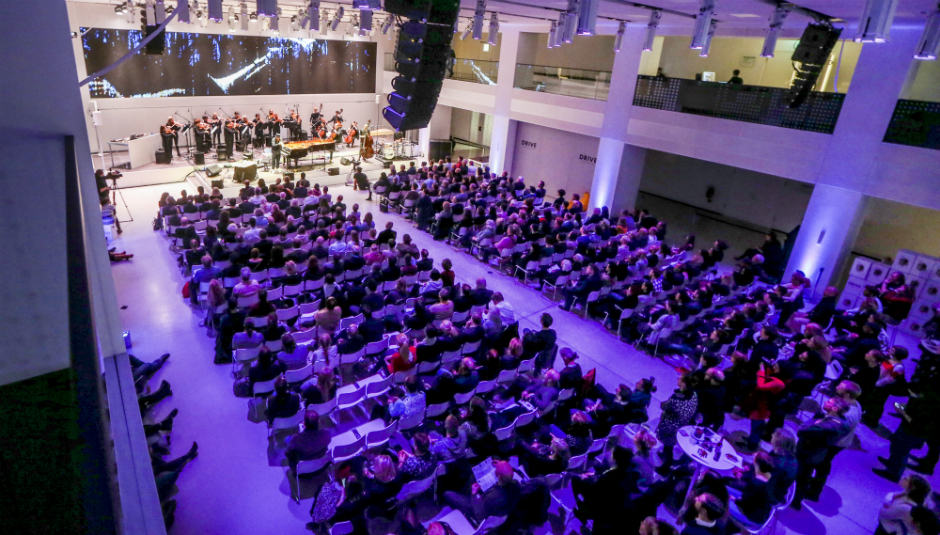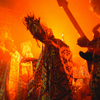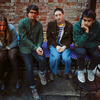Baroque music accompanied by a whisk, a spatula, and a kitchen sponge: it certainly has the potential to be, if not downright laughable, then at least horribly pretentious. But when Johannes Fischer performed his Music for electrified table and strings – a dining experience with Telemann in Berlin this month, it was somehow neither of those things.
As he scraped the sponge across the table and twanged the spatula, I found myself pondering the nature of sound and music, wondering whether there really was such a difference between a bow scraping across a taut string on a box of wood and a whisk being rubbed in circles on a kitchen table. It was certainly a literal interpretation of ‘Tafelmusik’, the work that inspired it (which translates as ‘table music’) – and in any case, at the time it was written, it would probably have been performed to a backdrop of festivities that might well have involved the sound of kitchen implements.
Fischer’s performance was given as part of a concert in the Neue Meister series, run by record label Berlin Classics. Founded in January 2016, this series is a chance for the label’s artists to perform live, accompanied by the Deutsches Kammerorchester Berlin. Neue Meister aims to play with traditional definitions of classical music, presenting it alongside experimental art, electronica, jazz, pop and other genres.
The concerts have so far taken place in the DRIVE: Volkswagen Group Forum, a bright and airy space in Berlin’s upmarket Mitte district that usually functions as a car showroom, but is transformed by night into an ad-hoc concert venue. The décor is mainly white, complemented by glass and sliver – a refreshing antidote to the sometimes dark and dingy venues where contemporary classical music is often performed. There’s a temporary stage, some seating at the front and, for those who don’t get there early enough to grab a seat, a few high tables to stand around at the back. A pop-up bar is open throughout the performance, meaning you’re free to wander off and get a glass of wine if some artist or other isn’t floating your boat.
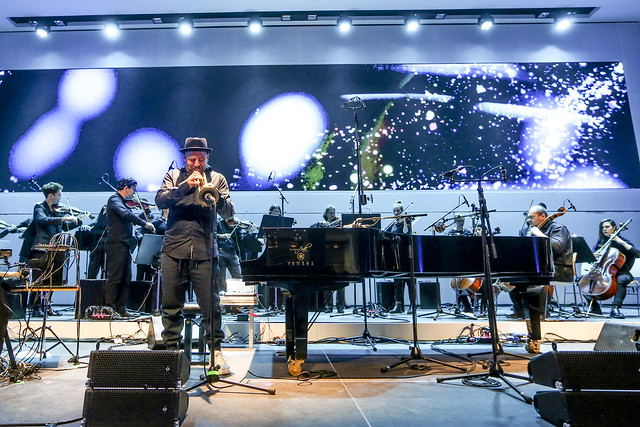
The evening began with a performance from German-Ukrainian pianist Marina Baranova, who brought us her own esoteric take on Debussy. In a year that marks the 100th anniversary of the composer’s death, Baranova has taken some of his best-known solo piano works and created her own versions of them, with a focus on what she describes as the “darker” side of his personality. Some remain solo piano works, albeit repurposed; others are accompanied by sound effects and vocal commentary. The result is a collection of pieces that echo Debussy, rather than directly paying tribute to him.
Next up was music by Los Angeles-based French electro-acoustic composer Daniel Wohl. Ambient sounds ebbed and flowed across the stage as the live instrumentalists played along with recorded electronic material, creating a mesmerising wall of sound – this was minimalism, but with a modern twist. We were then treated to a conceptual work by German composer Fabian Russ, whose field of work is apparently known as “orchestronics”. Using sampling as a base, Russ gradually adds layers of electronic sound and live instruments. The work performed here was based on a written description of a forest scene, with the sounds from the stage intended to represent the rustling of the trees and various animals scampering back and forth in the undergrowth.
At this point, it seems appropriate to mention that the entire concert was accompanied by live video art, projected onto the back wall behind the stage. Israeli-born, Berlin-based artist Safi Etiel combined pre-recorded images inspired by nature (water, fire, forests) with live footage of the artists as they were actually playing: a cellist’s bow arm here, a violinist’s focused expression there. This accompaniment truly enhanced the music and added an extra dimension to the experience.
The second half began with what was, for many of the audience members, the main event – pianist Olga Scheps, whose pianistic renditions of songs by the German techno band Scooter have made her something of a celebrity in her home country. Etiel’s video art really came into its own during this performance, as close-up images of Scheps’ arms and hands flickered across the screen, merging with colourful, vibrant abstract backdrops. However, for someone unfamiliar with the work of Scooter, the music itself seemed rather thin (it was at this point that I took the opportunity to visit the aforementioned bar).
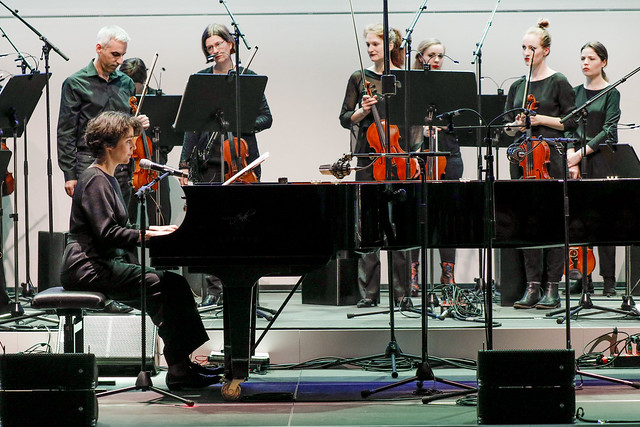
Fischer’s culinary reimagining of Telemann, which came next, was my personal highlight. A recent German review praised Fischer’s music for its ‘clarity, transparency and honesty’ – qualities that were certainly abundant in this performance. His work is a kind of musical performance art that draws you in completely, on both a musical and intellectual level.
The programme closed with a performance by jazz trumpeter and pianist Sebastian Studnitzky, famed for his collaborations with Nightmares on Wax and Jazzanova. Studnitzky performed four excerpts from his work Memento, for solo trumpet and piano with orchestral accompaniment. His music has proved notoriously difficult to classify, and it’s easy to see why – it’s rooted in the classical tradition, but there are also strong shades of jazz, pop, and electro. It was an intense, energetic way to end an intriguing evening.
For someone more used to being a spectator in purpose-built concert halls, it was surprising and refreshing for me to see people of all ages represented at a classical concert – not least a sizeable hipster crowd, ambling around in their oversize denim jackets and thick-rimmed glasses, clutching bottles of beer. The venue was suitably eccentric, and the opportunity to mingle and go to the bar (and bathroom) at will added to the informal atmosphere. ‘Neue Meister’ means ‘new masters’ – and although these contemporary talents might not yet have achieved the status of Bach or Beethoven, they are certainly masters of the unexpected.
Photo Credit: Isa Foltin

